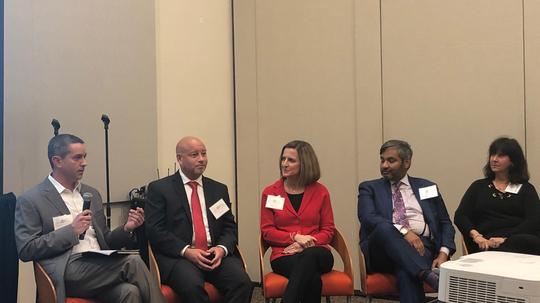
When Dara Simon was 19, she was in desperate need of lungs. But she told doctors the only reason she was at a transplant consultation with them was because her mom made her go.
She had been told the lungs would likely only last five years — it was the late 1990's and technology was still grappling with keeping organ transplants alive — and she didn't know if the major surgery was worth it.
"But the doctors said although the stats were what they were at the time, who knows what medication, testing and innovation was going to be like in five years," she said. "So I had the transplant."
And 22 years later, she told a full room at the Bryan Glazer Family JCC her lungs are doing well and joked she's probably taking less medication than they are.
"Here I am 22 years later," Simon said. "The medications I'm on today are quite different than 22 years ago. The routine is not as cumbersome as it was 22 years ago. And five years ago, the prognosis was quite different than it is now."
Simon was one of four experts who came together Wednesday night to discuss innovation in transplantation, an event hosted by the Florida Israel Business Accelerator.
"Our goal with Connection to Innovation events is to shine a light on innovation happening right here in Tampa Bay, in places you may not think about it," said Rachel Feinman, executive director of FIBA. "Everyone knows the medical field is innovative, but may not think about what is going on with organ transplantation and the lives being saved. We’re pleased to shine a light on that."
Tampa General Hospital's president and CEO John Couris kicked off the night by applauding the hospital for the more than 10,000 transplants done in the hospital since 1974.
"When I tell you we're an innovative institution, it's not just rhetoric — we really are," he said. "TGH conducted the first heart transplant in the state of Florida; that's innovation. Innovation takes courage and you have to be courageous to try new and innovative things. We have a rich history of firsts and that's just one example."
Experts talked about the multitude of innovation happening now, including the ability for patients with HPV to give transplants, increasing the efficiency of transporting the transplant with blood instead of placing it on ice and doing live transplants, i.e. using a partial liver from someone still alive.
"Transplantation has always been a field in medicine that's been associated with innovation," Kiran Dhanireddy, associate director of the Tampa General Hospital Advanced Organ Disease & Transplantation Institute said. "It's because of the courage of pioneers that we've gotten where we've gotten where we have. This takes courage, but courage is at the heart of innovation. When you started doing organ transplants there were people who said, 'We shouldn’t be doing that.' But in order to be an innovator, you have to move forward despite skepticism."
"When you started doing organ transplants, there were people who said, 'We shouldn’t be doing that.' But in order to be an innovator, you have to move forward despite skepticism."
While innovation is continuing to move at lightspeed, doctors are still grappling with issues that could slow them and patients down.
"Really what we’re trying to look at is how can we figure out how to limit drugs, because they're not necessarily nice," Dr. Debbie Rinde-Hoffman, advanced heart failure and transplant cardiology specialist at Tampa General Hospital said. "And with hearts, we don’t have much time. We really want to figure out did we get a good match, can we limit the medicine, are there things that can fight Mother Nature? Because she is designed to kill organ transplants."
Rinde-Hoffman and Simon both added there needs to be a larger push to fight misconceptions of organ donation.
"One of most common misconceptions when it comes to organ donation is the quality of life recipients have," Simon said. "They think we’re sickly and carry buckets of medication and are not leading productive lives; but I'm case in point that it's not true. That's a direct result of all the innovation related to transplantation."









